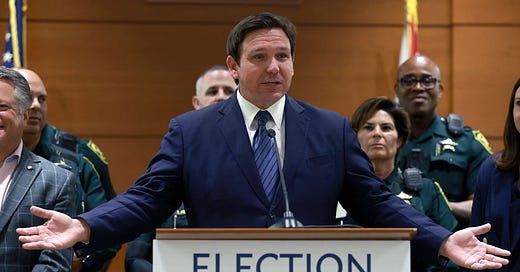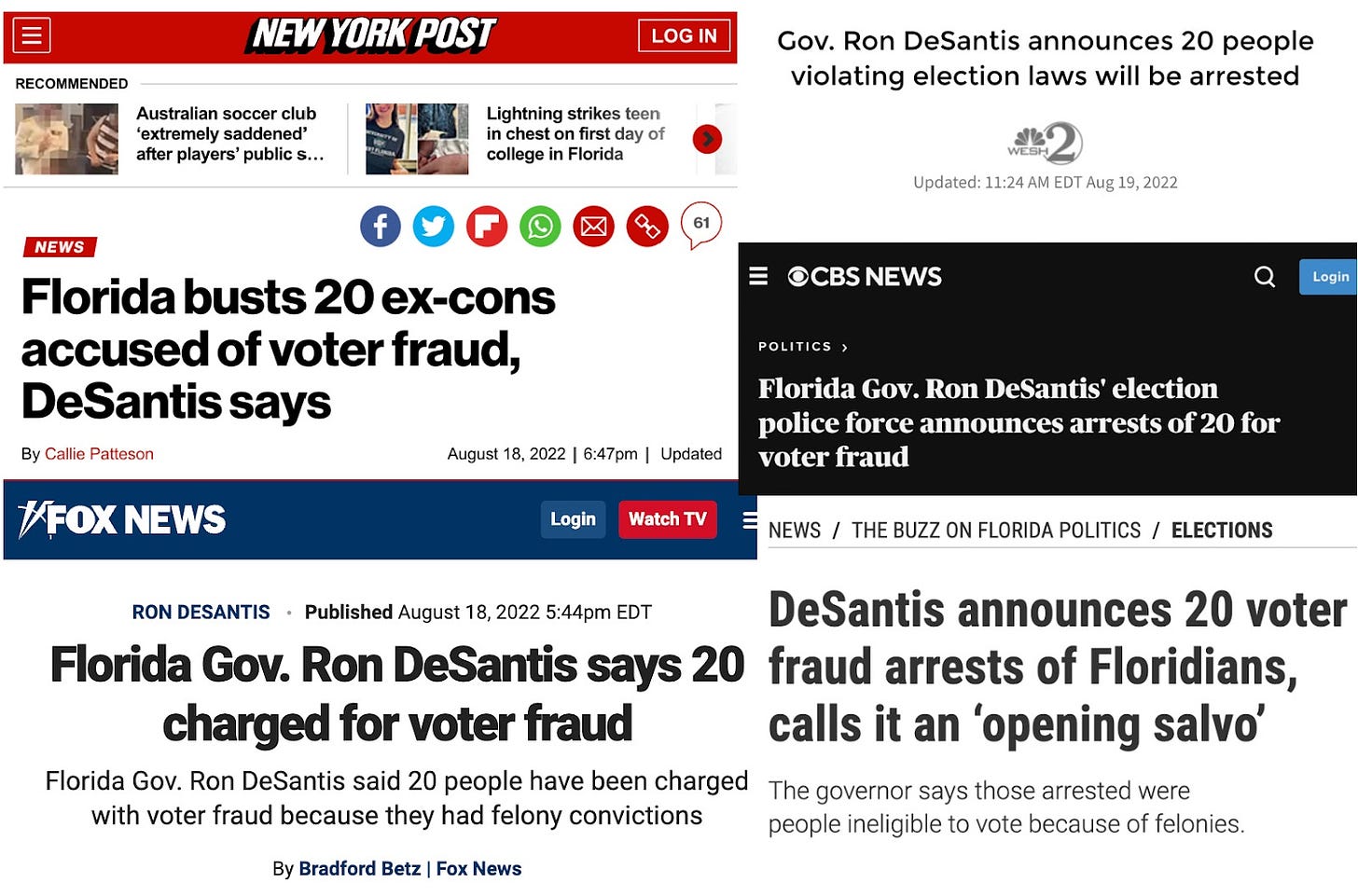
On August 18, in a "campaign-style event," Florida Governor Ron DeSantis (R) announced that 20 people had been arrested "for breaking Florida’s elections laws." In a press release, DeSantis' office set aside the presumption of innocence, branding the group "election criminals." The accused, according to DeSantis, were previously stripped of their right to vote after being convicted of murder or a felony sexual offense but voted in the 2020 election.
The charges were the first brought by the Florida Office of Election Crimes and Security, a new entity created by the Florida legislature at DeSantis' request earlier this year. The 20 voters account for 0.0000018% of the 11 million ballots cast in Florida's 2020 election. DeSantis described the arrests as the tip of the iceberg. “It’s not just going to be 20 arrests,” DeSantis said. “This is the opening salvo of an office that was just set up on July 1.”
DeSantis created the Office of Election Crimes and Security as he runs for reelection in Florida this year and considers a run for the presidency in 2024. At the state and national level, DeSantis' future hinges on his ability to appeal to Republican voters, many of whom erroneously believe Biden stole the 2020 election from Trump.
DeSantis' event successfully generated headlines that would appeal to Republican voters looking for validation of Trump's false claims about election fraud:
DeSantis' announcement had lots of political theatrics. It was held in a Florida courtroom, and Republican activists sat in the jury box waving signs saying, "My Vote Counts." But there were few specifics offered on the individual cases.
Based on voter fraud cases filed in five Florida counties and reviewed by Popular Information, it is clear why DeSantis didn't offer details. Many of the individuals charged were simply confused about their eligibility to vote. And that confusion was understandable. Several were told by state and local officials that they were eligible to vote.
Peter Washington, for example, is a 59-year-old man who was convicted of attempted sexual battery in 1996. He completed a 10-year sentence for his crime. According to a law enforcement affidavit obtained by Popular Information, Washington said that prior to his release, he was enrolled in a class to assist with his assimilation back into society. In class, he says he was told by a "probation officer that his civil rights would be automatically restored upon his release from prison." In 2019, long after his release and return to normal life, Washington "received a voter registration form in the mail, filled it out, and mailed it back to the Orange County Supervisor of Elections." Shortly thereafter, the "Orange County Supervisor of Elections office mailed him a voter card."
Washington also reported he "received jury summons on three separate occasions, which he reported for." In Florida, jury service is unavailable to ex-felons until their civil rights are restored. For this reason, Washington told the investigative officer, "he truly believed his civil rights had been restored."
Washington was not eligible to vote because of the nature of his offense. Amendment 4, which was approved by Florida voters in 2018, allows most ex-felons to have their voting rights restored. But there is an exception for individuals convicted of murder or felony sexual offenses. But the genuine confusion of Washington about his eligibility — a confusion that was apparently shared by Orange County — means that prosecutors may have difficulty securing a conviction.
Washington and the other 19 individuals were charged with one count of "false affirmation – voting or elections" and one count of "voting as an unqualified elector." Both of these charges require prosecutors to prove that the accused acted "willfully." For example, Washington is charged with false affirmation because, when he submitted his voter registration, he checked a box that said, "I am not a convicted felon or if I am, my right to vote has been restored." Meanwhile, the law applies to a person who "willfully swears or affirms falsely to any oath or affirmation…in connection with or arising out of voting or elections." Washington, however, believed that his voting rights had been restored because he was told that by a parole officer, received a voter registration form in the mail, and was summoned for jury service.
Other individuals charged with voter fraud were in similar circumstances. Robert Simpson, 62, was convicted of second-degree murder in 1992. He completed his sentence and registered to vote in 2019. According to a law enforcement affidavit obtained by Popular Information, Simpson registered because "he heard that people with a criminal background had their voting rights restored." Soon, Simpson "received via mail his Palm Beach County Supervisor of Elections Voter Information Card."
Notably, a spokesperson for the Palm Beach County Supervisor of elections told Politico that "the state notifies their office when a prospective… voter is convicted of a felony or otherwise ineligible." In this case, the state failed to notify Palm Beach County, which issued Simpson his voting card.
At trial, prosecutors would need to prove that Simpson willfully submitted a false voter registration when Palm Beach County — and, by extension, the state of Florida — confirmed his eligibility to vote. Simpson was not informed he was ineligible to vote until he received a letter from Palm Beach County on June 24, 2022.
Whether or not these charges could be proven at trial may be beside the point. Most of the individuals targeted by DeSantis have little education and few financial resources. And they are being threatened with the full resources of the State of Florida. One individual charged with voter fraud was reportedly "arrested at 6 a.m. when a SWAT team banged on his door." A helicopter circled overhead, and armed officers were posted in his backyard. He was not permitted to put on clothes and was taken to jail in his underwear.
Most of the defendants have already spent much of their lives tied up in the criminal justice system. In response to charges of voter fraud, they have had to come up with hundreds or thousands of dollars to post bail. The pressure to plead guilty and resolve the situation quickly, especially in exchange for a favorable sentence, will be enormous.
Regardless of how these cases are resolved, the facts do not support Trump's false claims of a systematic effort by Democrats to "steal" the election. (At least one of those charged registered as a Republican.) Nevertheless, DeSantis is successfully using the prosecutions as part of a political strategy to appeal to voters that have embraced Trump's lies.
A textbook strategy
DeSantis' press strategy is to (1) make a splashy announcement with a simple, misleading narrative, (2) generate heaps of media coverage based on that misleading narrative that benefits him politically, (3) count on the media (and the public) to lose interest as the truth slowly trickles out.
This is the strategy DeSantis used earlier this year when he announced on April 15 that he was rejecting dozens of math textbooks for attempting to "indoctrinate students." The release claimed that publishers of dozens of math textbooks were promoting Critical Race Theory (CRT).
The release included a quote from DeSantis, who explicitly stated that publishers were targeting elementary school students with radical theories about race. "It seems that some publishers attempted to slap a coat of paint on an old house built on the foundation of Common Core, and indoctrinating concepts like race essentialism, especially, bizarrely, for elementary school students," DeSantis said.
These claims generated plenty of headlines:
But, at the time of the announcement, DeSantis and the Florida Department of Education didn't provide a single example of CRT in elementary school textbooks. But several days later, when Popular Information was able to obtain several of the textbooks, there was no evidence of CRT or the claims made by DeSantis and other Florida officials.
Weeks later, the Florida Department of Education finally released the reviews of the textbooks performed by individuals appointed by the state. There were 16 reviews of seven elementary school textbooks banned by the state. An analysis by Popular Information found all 16 reviews concluded that the textbooks did not include CRT.
But, at that point, most of the media was focused on other stories. DeSantis had generated the headlines he wanted with his initial announcement and had moved on to the next battle in the culture wars.






Unfortunately, he correctly counts on the citizens to lose interest--and it works. They 'they' have made our country a reality tv show. Keep getting this good information out there, Judd--well done, all we can do is keep speaking truth to power.
He gets away with it because of capitalism. News and information has been transformed into "product" and "entertainment" with the focus on generating profit through advertising, as opposed to ACTUALLY informing the populace. This type of media strategy will always work unless, like with politics in general, the profit motive is removed.
Speaking of old Ron, it looks like Charlie Crist may have a little something for Ron's a** and may the best man (Crist) win their contest for governor.